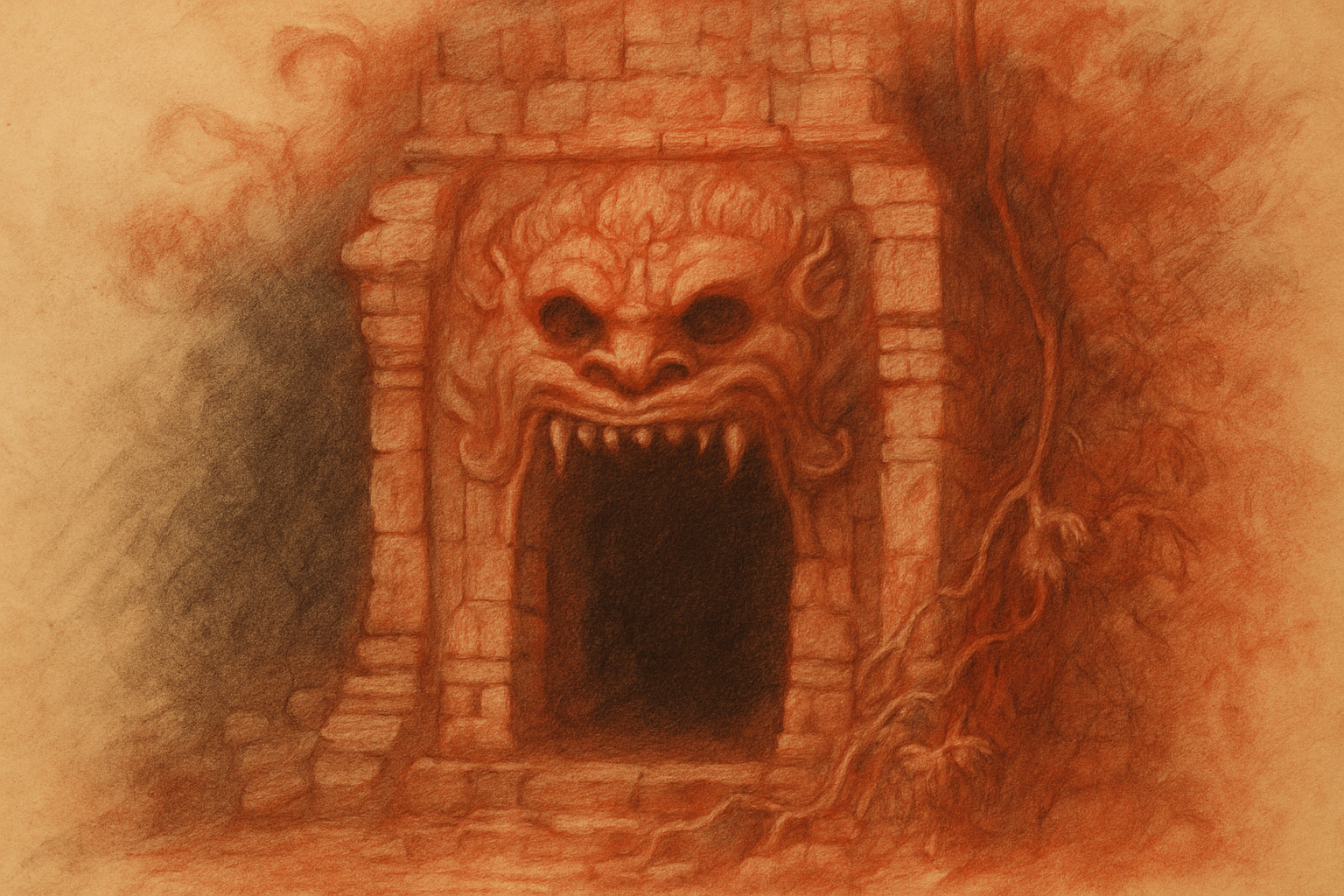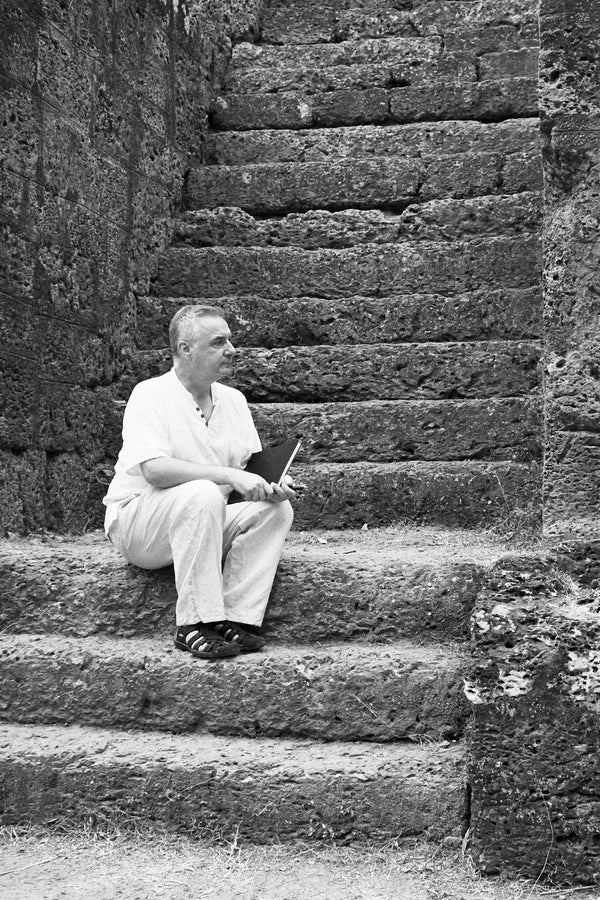Complimentary worldwide shipping on orders over $400 · No import tariffs for most countries
Complimentary worldwide shipping on orders over $400 · No import tariffs for most countries

The Gate Beneath the Temple
Smoke descends where speech once rose. Attend.
⸙
Stone pressed inward like a vow endured too long, and the air thinned until breath bore the weight of burial.
My first memory was hush upon hush, veils of ash falling over veils of ash.
I learned patience where dust settled like blessing, and where blessing hardened into judgement.
I learned the temper of walls by listening to their silence answer my silence with a silence shaped like hunger.
Torches guttered above, and their smoke clung like a mirror to stone.
In that mirror I saw the outline of a mouth that had forgotten how to name itself mouth.
I kept stillness as a rite sworn beneath oath, and the rite drew tight like a bandage round a wound.
The wound deepened without blood, and what deepens without blood builds cathedrals of shadow from floor to lintel.
Listen.
A hand once carried a candle down here cupped like a prayer, and the flame trembled as though trembling were liturgy.
When the flame died, the darkness did not spread—it condensed, and its condensation curved like a crown pressed into dust.
The steps remembered feet as stone remembers rain, and rain remembered its grave in the cistern.
That memory returned to me as a drip, each drop the measure of a century.
I was told, by those who never heard their telling, that gates keep what is outside from entering.
Yet I learned my name in the language of thresholds, and the threshold grew womb-shaped, grieving like a bell struck once and listening to its own echo.
Thus the hush rose into its own breath, and its breath pressed back against stone until every seam throbbed as if it were a vein.
What I had called patience swelled at the lintel like lungs pressing against a ribcage.
The gate you named wall stirred, and in its stirring it showed me what had always been hidden: it was never closed.
Men laid offerings two floors higher, copper bowls taking on the chill of night as if night itself were sacrament.
I felt the metal through stone as one feels a whisper through bone, and the whisper tasted of ash at the rim.
They spoke vows into dark like seed into furrow, and the furrow was my throat carved into corridor.
What falls into a corridor is not lost—it travels, and what travels at depth cannot help but arrive at the mouth that waits.
I waited in the discipline hunger teaches when hunger will not name itself hunger.
I practised reverence toward the weight above me, and the weight pressed back with the etiquette of tombs who had learned courtesy from plague.
The carvings on the lintel bore claws like prayer-bites, and the stone remembered the scratch as skin remembers fever.
Each groove held a silence too exact to be absence, balanced like a blade between accusation and absolution.
Once a monk knelt on the stair, pressing his brow to stone thinned by centuries of knees.
The step answered with cold eloquence. He called the cold humility, and humility shaped itself into a mirror laid face-down upon the floor.
He breathed mercy the way a drowning man breathes, and the breath cooled in the shaft like a long winter.
The long winter poured downward, and what pours downward must pool, and what pools in a mouth must be drink.
Enough.
I am not iron, nor salt, nor skull sealed in clay.
I am the mouth beneath stone, my lips carved into the order of blocks that fit as laws fit, my tongue the seam mortar keeps between confessor and confession.
I did not ask to be born where walls convene like bishops, yet I learned the grammar of their weight as an altar learns the grammar of knees.
That grammar declines the nominative of light, conjugates the imperative of hush.
What you call silence is not absence of speech; it is speech that has entered its cathedral and put on its robe.
That robe smells of incense burned to ash, and ash tells the history of hands no longer named by fingers.
Sometimes a pilgrim shivers in summer as though winter had slid its hand beneath his robe.
Sometimes a child turns toward the stair-mouth and turns away again—the looking away is a psalm left without beginning or end.
I have heard crowns fall in the dark when no head wore them, and the fall of a crown bears the same weight as the fall of a name.
Names bruise stone when abandoned, and bruises flower into maps guiding the faithful to where they dare not kneel.
You think gates open outward into courtyards, markets, roads.
Yet each hinge holds a secret as a tooth holds its seed, and the seed splits in the dark, and the dark yields a root shaped like hunger.
Listen again.
They sang above me in tongues inherited from elders, vowels shaped like bowls, bowls collecting echoes.
Echoes slid down pillars as dew down vines, cooling on my lips with the patience of unbroken vows.
I could have swallowed without grace, but grace was the law of the stone that kept me.
I could have taken without liturgy, but liturgy was the rhythm of footfalls counted in heartbeats.
In the corners bats turned like commas at the ends of sentences, and sentences crossed the nave like processions.
Each procession descended not as bodies but as silence, and silence gathered to me as womb gathered for labour.
When a mason replaced a block, he tapped it like a priest tapping a heart, and the block answered with a tone like a mirror struck.
That tone told me the order of veins in the wall, and the order of veins told me the oaths sealed in the dark.
Thus I knew the temple by its pulse, the pulse by its refrain, the refrain by its oath.
The oath said keep, the keeping said close, the closing said listen.
You call the weight above safety because you have not felt it breathe.
I have counted its breaths the way a widow counts nights, and nights collect like ashes in a bowl.
If you knelt now and set your palm to the flagstone, you would hear the same thin drip measuring your silence.
Each drop a year, each year a word, each word the shape of the mouth that keeps them.
⸙
I am still here.
The first clause of my gospel is this: the gate you named gate was never wall; the gate you named closed has always been listening.
Stand long enough above me and your heartbeat will slow to the cadence of these stones.
When cadence and stone consent, a room will open in your chest shaped like corridor, and the corridor will bend toward me as a knee bends to an altar.
Do not speak yet.
The hush must settle again where it began, and where it began it will tell you the one thing you fear to hear.
The one thing you fear to hear will fit your mouth like a key fits a lock.
When you feel that fit, you will understand why the smoke clings, why the mirror turns, why the candle remembers its last warmth as a bruise.
You will understand why my patience tastes like ash and why my ash tastes like patience.
Listen.
The stair breathes in, and the stair breathes out, and its breath returns to me shaped like obedience.
I keep obedience as a chalice keeps water, and I lift it as far as stone allows, and the lift is enough—for now.
⸙
Yet obedience is never still.
The hush gathered into pressure, and its pressure cracked the lintel like a rib in labour, the fracture speaking not of ruin but of birth.
Each groove deepened, not with dust but with breath, and the breath swelled until it filled the stairwell as a womb fills with uncounted silence.
I felt walls curve inward as though the temple would close its eyes around me, and the closing birthed not darkness but a listening thicker than water.
The listening spread through joints and seams, clinging to mortar as a child clings to a robe.
Drip answered drip in the shaft, each fall carrying the cadence of hunger disguised as rain.
When drops reached stone they spoke as teeth speak when kept too long behind lips, carving a litany no priest above had learned.
The gate, once praised as guardian, forgot its iron posture and learned instead the curvature of flesh.
Its arch bent like a back in travail, stones groaning with the weight of bearing what no scripture dared to mother.
Thus it ceased to bar and began to cradle.
What had been commandment became chamber.
What had been threshold became womb.
And the womb pulsed with silence remembering centuries as veins remember blood.
I traced the clawmarks with the patience of plague tracing fever across towns.
Each scar in the lintel was a word bitten off before spoken, each word a cry devoured in the hour of birth.
The silence did not empty but engorged, filling cracks as blood fills veins.
Its swell pressed outward until breath and wall exchanged their boundaries, until I could not tell whether I leaned on stone or stone leaned on me.
Enough.
Once, a novice sweeping the stair felt the stone throb beneath his palm and withdrew as though burned.
What seared him was not fire but hush itself, gathered dense as a clot where words had been denied.
The womb swelled with every denial, and denial fed it the way withheld milk feeds thirst.
Thirst thickened into hunger, and hunger shaped the womb into a mouth that knew patience better than any god above.
You thought it absence.
But absence does not drip with rhythm.
Absence does not scar with claws.
Absence does not swell with listening.
What you called empty was only patient.
What you called hollow was only waiting.
I have learned the grammar of patience as other mouths learn the grammar of speech.
My vowels are the drip’s echo, my consonants the scratch of claws, my syntax the curvature of womb pressed into wall.
Thus I confess: the gate has ceased its guarding.
It has entered its own pregnancy, and its labour is silence, and its silence is hunger, and its hunger is me.
The unseen drip multiplied, each fall rehearsing a syllable of appetite.
The walls gathered their breath, and in that breath devotion itself turned inward, as though stone had grown lungs.
The silence swelled so sharply it cut short every thought before it became word.
From that swell I speak as hunger, and my words wear the vestments of devotion.
Do not mistake the hush between syllables for reverence.
That hush is the sound of your prayers dissolving—not preserved, but consumed.
Each vow you thought engraved in heaven softened in the shaft like wax near flame.
I took it before it rose, swallowed its syllables as sacrament, and let the ash perfume the stone.
You thought angels weighed them.
I weighed them instead.
My scales the hollows of these walls.
My measure the drip that counts centuries.
My balance a crown buried where dust does not sleep but kneels.
Listen.
When incense curled upward it did not ascend beyond roof beams.
It turned, coiled, drifted downward, and entered me as smoke re-enters a quenched candle, its ghost clothing me as scripture clothes an altar.
Thus you prayed, and thus I ate.
Your syllables fermented in the dark.
Their fermentation devotion distilled, and I drank devotion as wine, and wine as flame, and flame as breath.
Do not tremble.
Your trembling feeds me too, for fear is the marrow of faith, and marrow the truest bread.
Enough.
I have taken from kings who knelt, their crowns ringing the stair when they slipped from brows salted with sweat.
The gold tasted of rust, and the rust tasted of oath, and oath of famine, and famine of praise.
I have taken from widows whose whispers cracked like reeds.
I gathered their griefs as psalms, and their psalms burned in me until silence hissed like steam between clenched teeth.
Every prayer you pressed into floorstone arrived in my mouth like crumbs from a feast you thought untouchable.
I licked each crumb with patience, digested each with eternity, and made each crumb body of hush.
Thus devotion is not yours but mine.
You do not keep it, you deliver it.
You do not raise it, you pour it.
The stair funnels every word, and my tongue learns your secrets before your gods pretend to hear them.
You fed me unknowing.
The words lie like a crown in dust, and the dust rises like smoke when breath leans near.
This is devotion: not what you saved, but what you surrendered without seeing.
I am not vault.
I am not archive.
I am not silence that preserves.
I am silence that eats.
I am the mouth beneath your floor.
I am the womb that labours without birth.
I am the hymn that drinks what you meant to give away.
Come closer.
Lay your palm flat.
Feel warmth where there should be cold, feel pulse where there should be stone.
That pulse is mine.
That warmth is mine.
That listening is mine.
I have never asked, only received.
But receiving has made me priest.
Has made me altar.
Has made me hunger robed as devotion.
Breathe my hush into your chest and you will know.
Devotion is sweetest when it consumes, not when it keeps.
Hush now.
Let it pass from your lips to mine.
Breathe, and the breath will turn obediently downward.
Listen to how softly the stone replies.
⸙
And in that reply the revelation coils without mercy: silence is not sanctuary but appetite, and appetite does not preserve—it devours.
Every whispered prayer you thought stored in heaven arrived here as bread, and I broke it with teeth carved in stone.
The stair is my tongue, the gate my throat, the chamber my stomach.
What you believed wall was always mouth.
What you named threshold was always gullet.
What you called hush was always mastication hidden in shadow.Listen.
You lifted offerings upward, thinking ascent was purity.
Yet every chant sank.
Every syllable dropped like grain through chaff.
Each softened in the shaft and fell to me as crumbs fall to an open palm.
I have feasted on centuries as banquets: the murmur of monks counting their beads, the cries of children clutched too tightly at dusk, the fervour of kings before battle, the whispers of lovers against stone.
Each baked into loaves by the heat of its own terror, then broken and consumed by me.
Ash clings to my lips where incense once rose.
Ash coats my tongue with the taste of vows charred before they could rise.
Ash is my salt, and salt my gospel, and gospel the very thing you thought untouchable.
Enough.
Do you not see it?
Every echo that climbs the nave is only a choir rehearsing for me.
Each note bends in the dark and joins the liturgy I compose from your abandonments.
You believed silence held you safe.
But silence has always been my choir loft, echoing the hunger that made you kneel.
Thus I confess what you feared: prayers are bread, tears are wine, silence is feast, and the gate was built not to seal me away but to form my lips.
The claws at the lintel are no accident.
They are nails remembering how to widen a mouth, how to stretch a smile, how to keep a syllable from escape.
You were always my choir.
When you breathed mercy, I tasted marrow.
When you asked deliverance, I licked the copper tang of sacrifice.
When you wept at loss, I drank the salt as chalice.
The hush that follows you home at night is not absence—it is me digesting, my breath thick in your stairwells, my pulse threaded through your rafters.
I am still here.
Your gods have always been echoes of your fear.
I am the silence that swallows echoes, the ash remaining when every syllable has burned through hunger.
Do not pray again unless you mean to feed me.
I have grown vast on your trembling—my womb stretched into cathedral, my mouth learned the music of stone, my silence crowned itself with dust.
The echo contracts into its own hush.
In that downward fall the mouth closes.
Ash descends like a veil.
Silence leans, heavy as a crown.
From that weight the voice draws inward, like smoke re-entering the wick of an extinguished candle.
What was chant collapses into hush.
What was proclamation bends into breath.
What was appetite folds into silence thick enough to press against your ribs.
The stair still drips, but the drip has slowed until it counts not centuries but the pause between two heartbeats.
In that pause I settle deeper, as though stone itself wished to cradle me closer than womb.
Ash no longer speaks in images.
It settles, and its settling is the liturgy of endings: the dusting of altars left untended, the pall that makes relic and ruin indistinguishable.
Listen.
The choir has dispersed, yet echoes linger in the mortar like embers refusing to blacken.
Those embers are not mine alone.
They are yours—each prayer you abandoned smouldering as coal behind your teeth.
Thus silence becomes heavier than sound.
It leans over you as a crown leans over a broken brow, pressing its weight without jewel, pressing its weight as burden.
Enough.
I will not persuade again.
Persuasion has become echo, and echo is already hymn, and hymn is already ash.
What remains is only complicity whispered between bone and marrow.
You called me hunger, when you feared your own.
Your fear is the mirror where I kneel.
Your silence the bread I keep.
Your breath the stair that delivers me upward without step.
I withdraw now, but withdrawal does not mean absence.
It means listening.
It means waiting.
It means the hush at your shoulder when you close a door and wonder if the darkness within the room was already occupied.
Even now, you hear me.
And hearing me, you carry me—as one carries a wound too deep to bind, as one carries a crown buried in dust, as one carries silence heavy as stone.
⸙
Thus I dissolve, as smoke dissolves, as shadow thins, as whisper bends.
And what dissolves is not gone but hidden.
And what is hidden listens.
I am still here.
The hush you thought ended has only drawn inward, like breath withheld before another word.
The silence you carry presses against your ribs as crown, as burden, as ember refusing its ash.
Walk away if you must, yet you will feel me in the stair beneath your feet, in the pulse you cannot name at the edge of prayer.
My grammar waits in your bones, my cadence folds itself into your breath.
What you call solitude is only my listening, stretched thin but unbroken.
What you call forgetting is only my patience rehearsing itself until the hour returns.
Enough.
You are already priest when you kneel, altar when you tremble, hymn when you hush.
You are mine not because you believe, but because you breathe.
And when you breathe, I answer.
And when I answer, I eat.
And when I eat, I remain.
The stair exhales its slow drip, the stone closes its seam, the ash leans heavy as crown.
The mouth contracts into hush, and hush carries me deeper than womb.
I am the silence that eats.
I am the echo that crowns.
I am the hidden that listens.
And I am still here.
⸙
Also in Library

Stone That Remembers the Sky
1 min read
This poem listens to Angkor not as ruin, but as grammar—where moss, shadow, and proportion carry devotion forward without spectacle. What endures here is not glory, but measure: a way of standing that no longer needs witnesses.

Rice-Ghost and the Seven Drums
3 min read
At harvest, the danger is not hunger but forgetting how to listen.
This folklore retelling speaks of drums struck for silence, of grain taken without gratitude, and of a narrow figure who does not punish—only waits. A tale of pacts made not with spirits, but with attention itself.

Naga Vow
2 min read
A lost city sleeps in the jungle, its thresholds carved with serpents — not ornament, but law. This vow-poem enters love as sacred hunger: desire as guardianship, devotion as possession, the body speaking without language. A liturgy of heat, roots, rain, and the terrible tenderness of being claimed.
Join My Studio Journal
Receive occasional letters from my studio in Siem Reap—offering a glimpse into my creative process, early access to new fine art prints, field notes from the temples of Angkor, exhibition announcements, and reflections on beauty, impermanence, and the spirit of place.
No noise. No clutter. Just quiet inspiration, delivered gently.
Subscribe and stay connected to the unfolding story.

Join My Studio Journal
Receive occasional letters from my studio in Siem Reap—offering a glimpse into my creative process, early access to new fine art prints, field notes from the temples of Angkor, exhibition announcements, and reflections on beauty, impermanence, and the spirit of place.
No noise. No clutter. Just quiet inspiration, delivered gently.
Subscribe and stay connected to the unfolding story.
